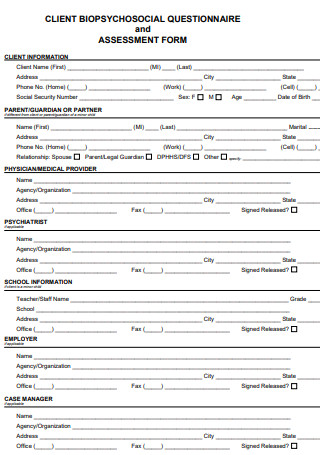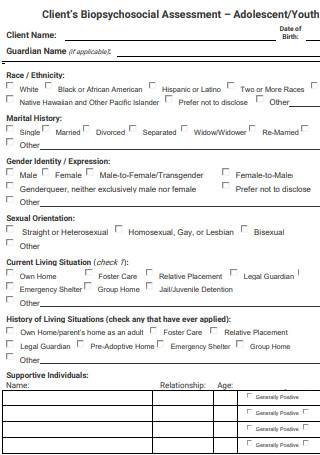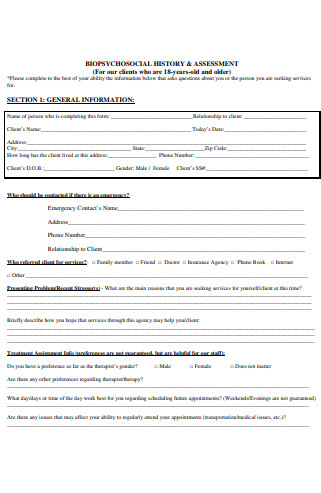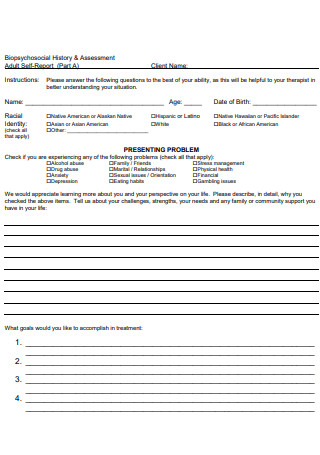3+ SAMPLE Client Biopsychosocial Assessment
FREE Client Biopsychosocial Assessment s to Download
What is a Client Biopsychosocial Assessment?
A client biopsychosocial assessment is an assessment that therapists do for their clients regarding the biological, psychological, and social aspects of their lives. In this assessment, clients will have to answer biopsychosocial assessment questions. They might be given a health questionnaire that can be the best biopsychosocial assessment tool for how to assess the biopsychosocial of a client. Well, are you wondering what is a biopsychosocial assessment in mental health? Or what is included in a biopsychosocial assessment? You can learn everything about this in this article.
A biopsychosocial assessment cheat sheet or a biopsychosocial assessment PDF can help you understand what a biopsychosocial assessment is. If you want, you can search for a free biopsychosocial assessment template or a biopsychosocial assessment example. Though you do not have to look further because we offer templates that you can use. We can also make you know how to do a biopsychosocial assessment. A client biopsychosocial assessment is part of a patient medical report or health report that counselors use to make the right treatment for clients. Through it, they can be helped to make the right diagnosis for clients.
Key Factors on a Client Biopsychosocial Assessment
Based on a model proposed by Dr. George Engel in 1977, a client biopsychosocial assessment can be assessed through three factors. They are biological factors, psychological factors, and social factors. Below are the explanations that you can have for these three factors.
Biological Factor: The things that fall under the biological factor are medication effects, stress reactivity, neurochemistry, immune function, genetic vulnerability, disability, physical illness, and gender. If the clients have taken some medication before, it may be one of the reasons why they are having a mental problem. We know that medications have adverse side effects sometimes. So, the change in their mood may be caused by the medications that they have taken. Another thing is that maybe they have been suffering from stress. The reactions to stress can surely change the disposition of a person. Especially, if they are always stressed. Also, the chemistry in our brains greatly affects our behavior. If there is an imbalance of nutrients in our brains, we can have mental problems. One more thing also is the immune function. If our immune system is weak, it can affect our brains. That is why we have to eat healthily and maintain healthy living to have a strong immune system. We may never know the problem in our health that we can have if we have a weak immune system. One of those problems is having mental problems. To add with, genetic vulnerability can also affect our brains. If our genes are prone to mental problems, then we can do nothing but accept the fact that we can have some mental illness. Also, if you have a disability, you may have the stress of being a sick person. People who are sick are usually irritated and bad-tempered. This can lead to a mental illness that needs to be cured. The same thing goes for a person who has a physical illness. The last thing is gender. Gender has something to do with behavior. We know that there are great differences between men and women. All these things affect the biological factor of the biopsychosocial assessment. Whether you are having a child biopsychosocial assessment or an adult biopsychosocial assessment, you have to deal with the biological factor.Psychological Factor: The things that fall under the psychological factor are past trauma, attitudes & beliefs, personality, cognitions, behaviors, emotions, learning & memory, and coping skills. To assess the psychological condition of a client, you must know about these things. The past trauma of a person greatly affects the future of this person. He or she may avoid certain things because of past trauma. Revealing past trauma can enable the therapists to help the client to overcome this problem. On the other hand, the attitudes & beliefs of the clients greatly affect their behavior. They tend to do some things because of their beliefs. Another thing is the cognitions of the clients. Whatever the clients usually think, this affects their behavior. For this reason, therapists should know the common things that are in the mind of clients. And of course, behaviors affect the mental health of the clients. If they are used to having bad behavior, this can cause them to be in a lot of trouble which can bring them stress. That is why you should know the behaviors of clients in their daily schedule or when they are having their work schedule. If you want to have a good example of a biopsychosocial assessment, you should also consider the emotions of the clients. Their emotions have a great effect on how they deal with everyone every day. Another thing that you should consider is the learning & memory of the client. Through it, you will know how they deal with things. What are the things that they usually remember? How do they respond to everything they learn? Lastly, consider the coping skills of clients. Are they having difficulties solving their problems? Do they want to give up when they experience hard problems? The psychological factor of the biopsychosocial assessment is important. It is one way to understand what the clients have been going through.Social Factor: The things that fall under the social factor are education, socioeconomic status, cultural traditions, family background, and social support. Education greatly affects the disposition of a person. If one is uneducated, he or she may get involved with crimes because of poverty. Though it can also happen to an educated person. This kind of thing may happen to people who do not want it to happen. The socioeconomic status of a person also affects his or her behavior. Some are rich and do not care about others. Some people are poor which is why they are used in enduring many things. Some actions are affected by the economic status of a person. It also affects how they deal with others. We also inherited some cultural traditions from our ancestors. This affects our decisions and how we see life. If your family is devout in religion, then you may inherit the customs that they have. Another thing is the family background. Family assessments show that people who come from broken families usually suffer from depression. We know that it is not easy to have problems within the family. Also, if we have a rich family, this can affect the way that we see ourselves. You may think highly of yourself because you are rich. The last thing is social support. Does the client get social support from his friends? Does the client get along well with his or her co-workers when at work? Everyone needs social support so when one cannot have this, they might feel bad. So, you know that social factors are another vital thing. These help therapists get an accurate assessment of the client.
Tips on Client Biopsychosocial Assessment
To have a biopsychosocial assessment is to view the life of the client. Therapists have to be careful in doing this thing. What are the things that can help a therapist in doing a biopsychosocial assessment? Maybe some practical tips can help.
Know Facts from Impressions: Before you make conclusions after reading the biopsychosocial assessment form of the client, be sure that you are relying on facts and not on impressions. Never make false impressions about the information of clients. Rather rely on facts. You must make the right conclusions that will be based on the true things that are happening. If you will make wrong impressions, your clients may not get the right treatment. This will not be good because it will take longer for the patient to be cured. So be sure about your observations.Use Technology in Making Documentation: Using technology to make your work easier is the best. Especially, in doing documentation for the important information of clients. You can have a better client profile if you will use good technology in the documentation. This can give you convenience when working. You will not have difficulties tracking files. There is an assurance that you can take care of your documentation better.Prioritize Information: Some information may be of more importance than others. You have to analyze accurately how you are going to use the information that you have gotten from the client. Know that your recommendations depend on the best information. So, you have to know how you can prioritize information.Keep Records of Clients: Always keep records of your clients. Maintain your file to be safe. Remember, though your client may stop visiting you for a while, they may come back to you in the future. And who knows if they might need their information from you? So, you must keep documentation for your clients.Remove Irrelevant Details: After prioritizing information, you may see the irrelevant details from your assessment. You have to remove this information because it might confuse the readers of your assessment. Even the client may be confused by irrelevant information. Keep only important details that you think can help the client. This way, you can have a concise assessment that will be easy to understand.Consider Accuracy: Make sure that your assessment will be accurate. Get the right details from the health information report and health questionnaire of clients. By having accurate details, you can make the right observations. If you think that something is important, be sure to include this in the assessment.
How to Create a Client Biopsychosocial Assessment
After you have collected the information of your client, you should make an assessment. This contains your recommendations for the clients. If it is your first time having this assessment, you can have the following steps:
1. Gather the Basic Information
Make the client fill out a biopsychosocial assessment form. You need to gather important information about the client on his or her biological, psychological, or social aspects.
2. Know the Client’s History
Get the personal information of the client. This includes family history, educational background, employment history, religious practices, military history, medical background, mental history, social activities, basic life functioning, legal concerns, and environmental factors.
3. Write the Assessment
After you get all the necessary information, you must make an assessment. Make sure that the assessment will be accurate. You can have a health checklist to help you with this.
4. Make Recommendations
The most special part of the assessment is the recommendation. You must make recommendations that can serve as the treatment for the client. This recommendation should be based on your analysis of the problem of the client.
FAQs
Who should conduct the client biopsychological assessment?
Medical health professionals can do the client biopsychological assessment. This includes therapists, counselors, and physicians. The assessment can be done together with annual check-ups to ensure the overall health status of the client.
When the biopsychological assessment is made?
At the beginning of the therapy, the biopsychosocial assessment is made. You can schedule regular sessions to monitor the progress of the client.
Through the client biopsychological assessment, the weaknesses of clients will be revealed. You will know the problems that they have gone through and have been experiencing. It is a very great way to help clients and to know the treatment that is suited for them. Conduct a client biopsychological assessment with your clients to take care of their welfare.




